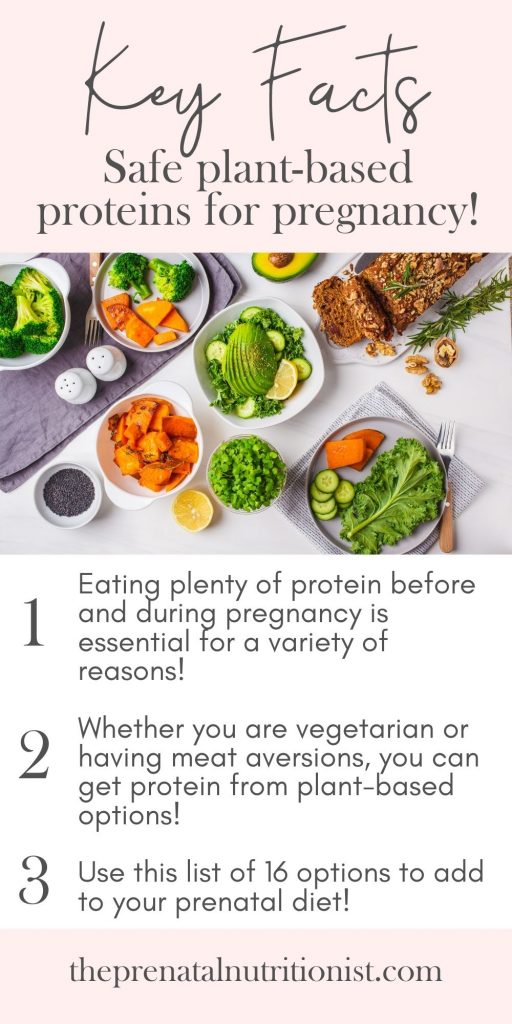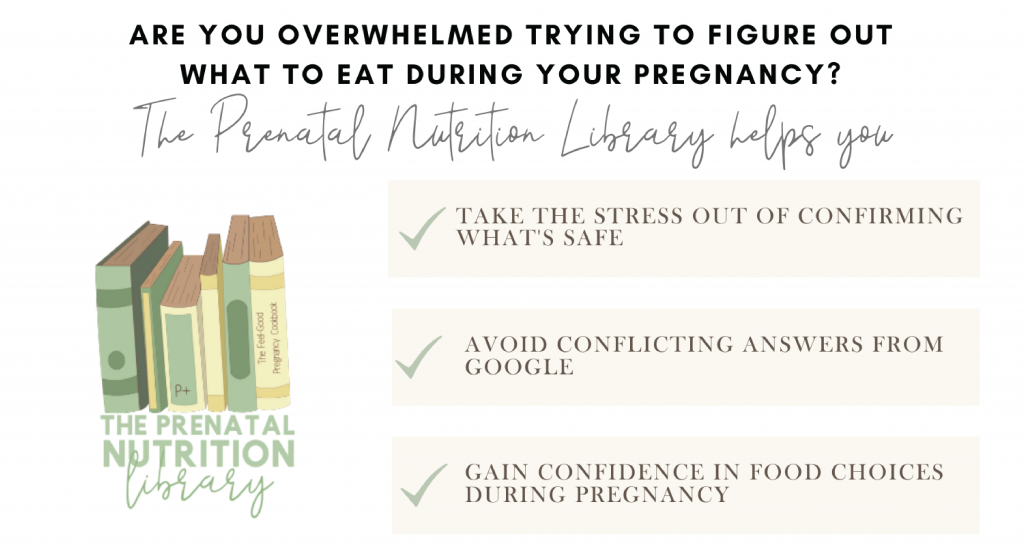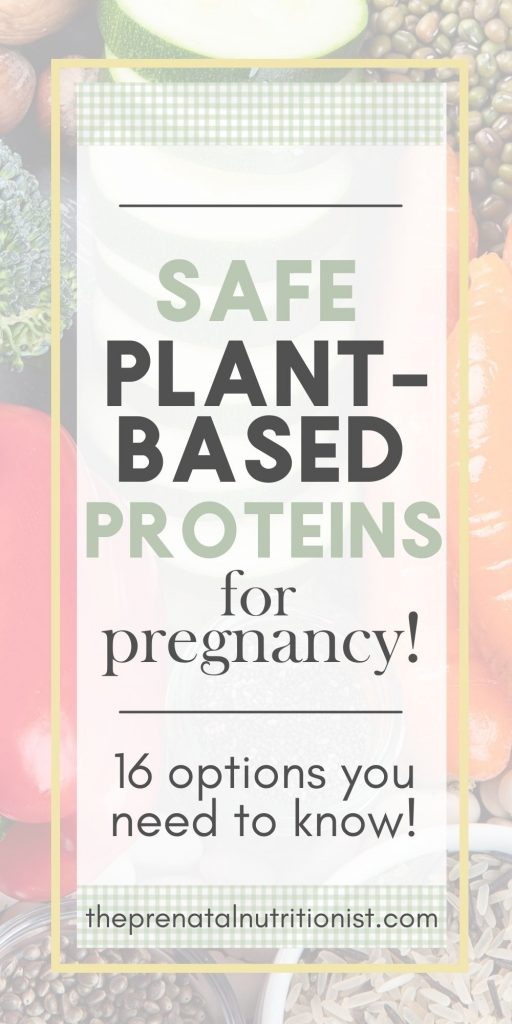
Eating plenty of protein before and during pregnancy is essential for a variety of reasons! Research states that a protein-rich diet is linked to increased fertility and embryonic survival, as well as the healthy growth and development of the fetus. Protein is also a key to feeling full and satisfied after meals and keeping up a healthy weight gain during pregnancy. A steady influx of protein will also help you maintain strong muscles as your body goes through the many changes associated with pregnancy.
Protein needs will vary per individual, but research shows adverse outcomes with both under-consuming and over-consuming it. You will learn how to calculate your unique protein needs inside The Prenatal Nutrition Library.
Studies show that under-consuming protein during pregnancy may lead to serious complications. These could include embryonic loss, intrauterine growth restriction, and reduced postnatal growth.
The most common food group people think of when talking about protein is meat. Luckily, you can get protein from many different sources though. It’s actually wise to choose a variety of both plant and animal proteins because these foods also contain many other nutrients in addition to protein. Also, if you’re feeling averse to meat in the first trimester, plant-based options can be a great option to turn to!
The foods we are discussing today are all plant-based sources of protein as well as other vitamins, minerals, fiber, and healthy fat. As mentioned above, you’ll see that these foods contain a multitude of other essential vitamins and minerals required for a healthy pregnancy.
So, let’s dive right in and discuss some good sources of plant-based protein that are safe to eat during pregnancy!
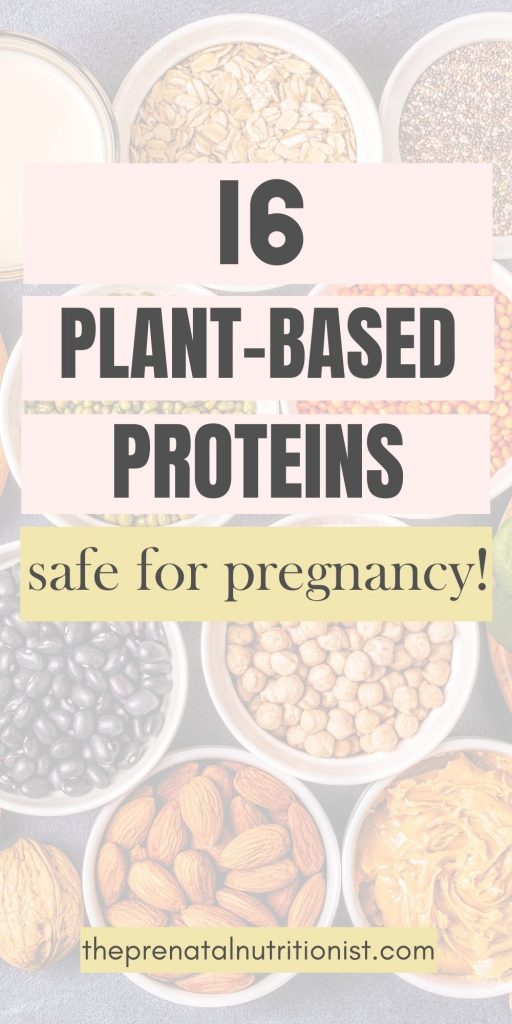
Plant-Based Protein Sources For Pregnancy
Tofu
Tofu originates from soybeans and is a very rich source of plant-based protein. It’s common to use tofu as a substitute for meat on salads, in stir-fries, and even with pasta. You can also add silken tofu to smoothies for an extra kick of protein. In addition to protein, tofu is also a rich source of vitamins and minerals, including iron and calcium.
Protein per serving: (20 grams / 1/2 cup)
Seitan
Seitan is made from vital wheat gluten and, like tofu, it is a good source of plant-based protein. This plant-based source of protein contains all nine essential amino acids. However, it is lower in lysine so be sure to include a variety of protein sources in your diet. To give your next healthy lunch idea for pregnancy a bigger boost of protein, include some pan-fried or grilled seitan!
Protein per serving: (25 grams / 3.5 ounces)
Tempeh
Tempeh has a naturally nutty flavor and, like tofu and seitan, is very popular among vegetarians and vegans as a source of plant-based protein. It is traditionally made from fermented soybeans. This nutrient-dense food contains protein as well as magnesium, calcium, iron, and more. It tastes delicious in stir-fries or fajitas!
Protein per serving: (15 grams / 1/2 cup)
Hemp seeds
Hemp seeds are one of my favorite seeds for pregnancy. And if you’re wondering, yes, they are a safe seed option for pregnancy. Hemp seeds are so versatile and can be thrown into smoothies, oatmeal, yogurt, or even used as a topping on toast. They are also a good source of healthy fats, fiber, and plant-based (non-heme) iron.
Protein per serving: (9 grams / 3 tbsp)
Chia seeds
If superfoods were a real thing, chia seeds would be one! They make a great addition to a healthy breakfast during pregnancy, including stirred into overnight oats, yogurt, smoothies, or even made up into a delicious chia seed pudding. Besides adding a few grams of protein to your diet, chia seeds are also a good source of non-dairy calcium, fiber, magnesium, non-heme iron, antioxidants, and healthy fats!
Protein per serving: (5 grams / 1 ounce )
Higher protein vegetables
Now, while vegetables aren’t going to be your richest source of protein, some veggies pack in a few more grams of protein than others and can boost your overall diet. Of course, vegetables are also rich in other nutrients that are good for mom and baby too. Green peas, brussels sprouts, asparagus, and broccoli are among some of the higher protein vegetable choices.
Protein per serving: (4-9 grams / 1 cup, cooked)
Black beans
Like many other beans, black beans are a good source of plant-based protein. Black beans make a good topping in tacos, bowl meals, quesadillas, or salads. In addition to protein, black beans are also a good source of fiber and folate – a very important nutrient for pregnancy.
Protein per serving: (15 grams / 1 cup, cooked)
Soybeans
Cooked soybeans are a very rich source of plant-based protein. Soybeans are commonly found in hummus recipes and used to make other products such as soy milk, tofu, and tempeh. In addition to protein, soybeans are also a source of fiber, folate, copper, phosphorus, and molybdenum.
Protein per serving: (15 grams / 1/2 cup, cooked)
Chickpeas
Another legume well-known for its protein and nutrient boost is chickpeas. Chickpeas, also known as garbanzo beans, are another common ingredient in hummus or side dishes. In addition to protein, chickpeas are a good source of fiber, iron, potassium, and magnesium.
Protein per serving: (15 grams / 1 cup, cooked)
Kidney beans
Kidney beans come in a variety of shapes, colors, and patterns. Chili, bean-based burgers, and bean salads are a few great ways to add kidney beans to your diet. Kidney beans are packed with fiber, protein, folate, potassium, and vitamin K1.
For the best taste, you can season kidney beans with natural herbs and spices in addition to a pinch of sea salt and pepper.
Protein per serving: (13 grams / 1 cup, cooked)
Lentils
Lentils, while they look more like seeds, are in the legume family because they grow in pods. There are a variety of types of lentils and they are super healthy and nutritionally dense food. They are packed with a plethora of essential vitamins and nutrients that are important for both mom and baby’s health, growth, and development. In addition to protein, lentils contain fiber, thiamine, niacin, folate, zinc, iron, and more!
Protein per serving: (18 grams / 1 cup, cooked)
Nuts
Both nuts and seeds provide an awesome boost of protein as well as healthy fats and other essential vitamins and minerals. They also make a super healthy snack idea during pregnancy! Peanuts, cashews, walnuts, and almonds are a few great options that could be added to your pregnancy diet.
Protein per serving: (4-9 grams / 1/4 cup)
Peanut butter
Yum…. who doesn’t love a good spoonful of peanut butter? Peanut butter is an excellent source of protein, vitamin B6, fiber, and magnesium. It makes a tasty addition to smoothies, toast, oatmeal, and yogurt. I recommend opting for an option without added sugar or vegetable oils.
Protein per serving: (8 grams / 2 tbsp)
Other nut butters
Not a peanut butter fan? No problem! Like peanut butter, other nut butters can provide a good boost of protein and other nutrients. For example, almond, cashew, walnut, pecan butter, and more! And, just one spoonful of nut butter can help manage those pesky sugar cravings commonly experienced during pregnancy too. If nut butter isn’t your style for a treat, check out these healthy sweets that are safe to eat during pregnancy
Protein per serving: (5-8 grams / 2 tbsp)
Plant-based protein powder
Protein powder can be used in a variety of ways to provide a great boost of protein. Many pregnant people find it especially helpful in the first trimester when feeling nauseous. While protein powder contains a good boost of protein, it shouldn’t be your sole source of this essential nutrient. For an extra protein boost, throw one scoop of pregnancy-safe protein powder into a smoothie or liquid of your choice and drink up! Need some smoothie inspiration? Try one of these green smoothies for pregnancy!
Protein per serving: (15-25 grams / 1 scoop)
Protein bars
Some of you may be wondering, are protein bars safe during pregnancy? The answer is yes… they can be! But, there are some considerations to keep in mind when choosing a protein bar to ensure you’re getting the maximum benefits and minimizing added sugars. For more information on this topic, be sure to read our full blog post on protein bars during pregnancy at the above link!
Protein per serving: (12-20 grams / 1 bar)
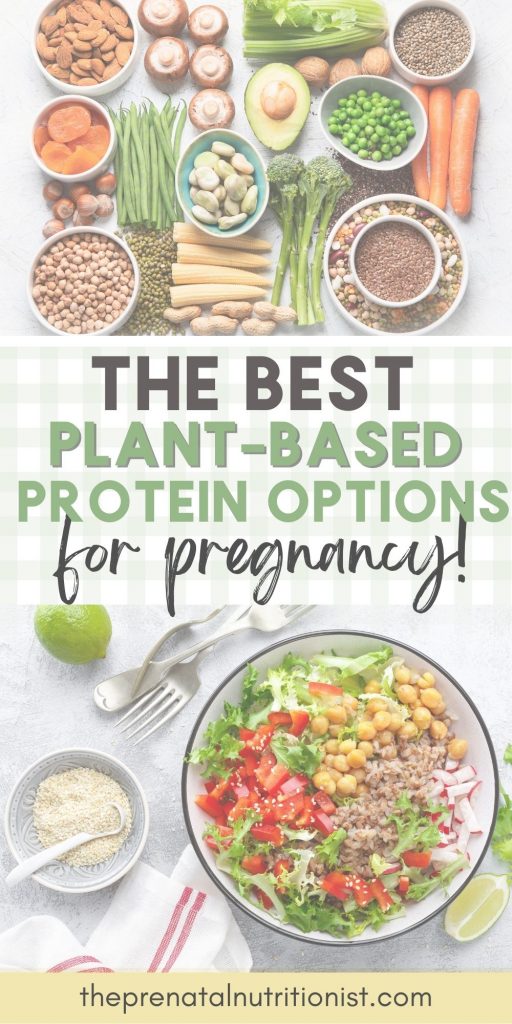
There are plenty of ways to ensure you’re meeting protein needs during pregnancy!
As you can see, there are plenty of plant-based foods you can eat to help make sure you reach your protein requirement each and every day of pregnancy. In addition to these foods, you can also find protein in animal sources such as beef, eggs, dairy, chicken, salmon, tuna, sardines, and pork. Protein is key for the proper development of your growing baby and to keep you feeling energetic, strong, and healthy throughout your whole pregnancy.
For our latest posts on prenatal nutrition, head over to The Prenatal Nutritionist Blog. And, if you haven’t already, be sure to download The Prenatal Nutrition Library app. We have a full note inside the library on protein intake during pregnancy, including a calculation to help you determine how much protein you should be eating each day. Download the app for free today to start exploring!
